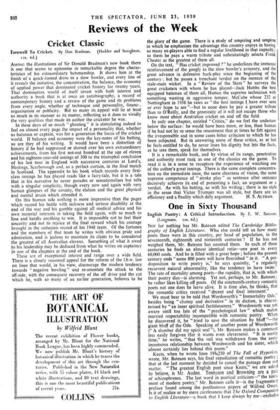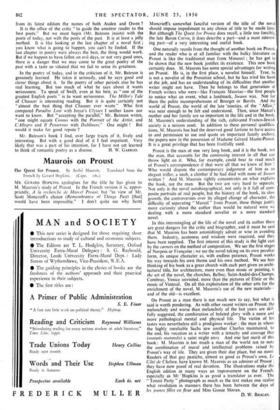One in Sixty Thousand English Poetry: A Critical Introduction. By
F. W. Bateson. (Longman. os. 6d.) NOT for nothing has Mr. Bateson edited The Cambridge Biblio- graphy of English Literature. Who else could tell us how many poets there were in this country, per head of population, in the seventeenth, eighteenth and ninteenth centuries ? If he has not weighed them, Mr. Bateson has counted them. In each of these centuries he finds an almost identical ratio—one poet in every 60,000 souls. And he is filled with a great hope ; before the present century ends " some 800 poets will have flourished " in it. " A pre- disposition to write poetry is," he says quaintly, " a regularly recurrent natural abnormality, like the tendency to have twins." The rate of mortality among poets—the rapidity, that is, with which their poetry dies—is alarming. Yet not, perhaps, to Mr. Bateson ; he rather likes killing off poets. Of the nineteenth-century romantic poets not one does he leave alive. It is time also, he thinks, that the romantic critics received " decent and final interment."
We must bear to be told that Wordsworth's " Immortality Ode," besides being " clumsy and derivative " in its diction, is charac- terised by " an inner spiritual factitiousness." WordswOrth was not aware until toe' late of the " psychological law " vhich makes married respectability incompatible with romantic poetry. When he discovered it, he " tried to save the situation by bluff "—the giant bluff of the Ode. Speaking of another poem of Wordsworth (" A slumber did my spirit seal "), Mr. Bateson makes a comment less easily forgiven (for it wants even cleverness). " It is surely time," he writes, " that the veil was withdrawn from the semi- incestuous relationship between Wordsworth and his sister, which almost certainly lies behind this poem." Keats, when he wrote lines 1980210 of The Fall of Hyperion, wrote, Mr. Bateson says, his final repudiation of romantic poetry ; that at the last moment he decided to cancel the passage does not matter. "The greatest English poet since Keats," we are asked to believe, is Mr. Auden. Tennyson and Browning are a pair of schizophrenes. The last word in poetical criticism—" the testa- ment of modern poetry," Mr. Bateson calls it—is the fragmentary preface found among the posthumous papers of Wilfred Owen. Is it of malice or by mere carelessness that The Oxford Companion to English Literature—a book that I keep always by me—excludes
from its latest edition the names of both Auden and Owen ?
It is the office of the critic " to guide the amateur reader to the best poets." But we must begin (Mr. Bateson insists) with the poets of today, not with the poets of the past. It is at least a jolly method. It is like looking at the last chapter of a novel first ; you know what is going to happen, you can't be fooled. If the last chapter in poetry were always the best, the thing would work. But if we happen to have fallen on evil days, or not very good ones, there is a danger that we may come to the great poetry of the past with a taste so vitiated that we fail to sense its greatness.
In the poetry of today, and in the criticism of it, Mr. Bateson is genuinely learned. He takes it seriously, and he says good and clever things about it. In the poetry of other periods also he has real learning. But too much of what he says about it wants seriousness. To speak of Swift, even at his best, as " one of the greatest English poets " is to want seriousness. The. Miller's Tale of Chaucer is interesting reading. But it is quite certainly not " almost the best thing that Chaucer ever wrote." Who first compared Paradise Lost with Joyce's Ulysses I neither know nor want to know. But " accepting the parallel," Mr. Bateson writes, " one might equate Comus with the Portrait of the Artist, and L'Allegro and Il Penseroso with Dubliners." One might ! But would it make for good repute ?
Mr. Bateson's book I find, over large tracts of it, lively and interesting. But with a good deal of it I feel impatient. Very likely that was a part of his intention, for I have not yet learned
to think of romantic poetry as a disease. H. W. GARROD.



































 Previous page
Previous page